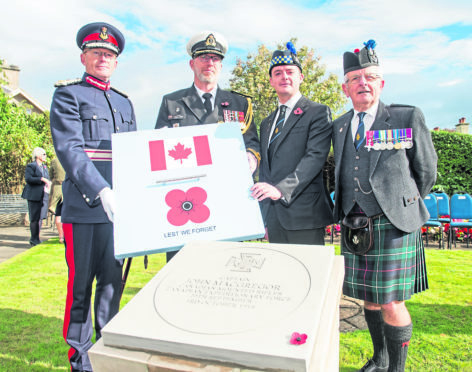A Victoria Cross hero who hailed from the Highlands – and became Canada’s most decorated soldier – has been honoured for his bravery in saving countless lives.
Captain John MacGregor was born in February 1889 at Cawdor, attended Nairn Academy and trained as a master carpenter and stonemason before emigrating.
In 1909 he crossed the Atlantic to Montreal and worked his way across Canada utilising his skills as a carpenter, mostly on the railroads, moving west as the work moved west.
>> Keep up to date with the latest news with The P&J newsletter
He finally ended up in the remote north-west, but on hearing Britain had gone to war with Germany he donned his snow shoes and set off over mountains, taking almost a week to finally sign up with the 11th Canadian Mounted Rifles.
He served time in Ypres and the Somme, and was quickly promoted after many senior officers were killed on duty.
At Vimy Ridge the soldier known to his comrades as Jock led a battle and captured a German ‘gun nest’, saving many lives after the troops surrendered.
He was awarded the Distinguished Conduct Medal, the highest award short of the Victoria Cross that may be made to a soldier below the rank of Warrant Officer.
Following an attack in No Man’s Land in 1917 he was awarded the first of his Military Crosses.
It was his actions in September 1918 which led to him being awarded the VC, leading various charges near Camrai, killing many enemy soldiers and capturing a number of prisoners, while securing prominent positions for further advances – and on one occasion he single-handedly went out in open fire to reach the enemy.
At Buckingham Palace, on February 26, 1919, the King decorated Capt MacGregor with the Victoria Cross and also a bar to his Military Cross.
In 2014, it was announced a commemorative stone would be laid in the home town of each soldier awarded the VC 100 years after their act of bravery.
And on Saturday, a service took place near the war memorial in Nairn in memory of Capt MacGregor.
Lt Col Bob Town, president of the Nairn British Legion, said: “The unveiling ceremony took place 100 years to the day when the action started which resulted in the award of the VC. He was very brave man who deserves this recognition one hundred years on.”
A message from his grandchildren in Canada was read, stating: “We would like to take this opportunity to thank everyone who made this day possible.
“We are honoured that this stone will be laid. To the committee members of the Nairn Legion and the citizens of Nairn, our heartfelt thanks for remembering John as one of yours.
“We know he was very proud to call Nairn home and always cherished and respected his Scottish roots.”
They added: “We plan to travel to Nairn in the future and very much look forward to visiting this site. With proud and heartfelt gratitude, Lance, Don and Jaye MacGregor and families.”
After the war, Capt MacGregor returned to Canada after the war and married a nurse, Ethel Flower, who had treated him after he battled a harbour fire in Prince Rupert. They had two sons.
After working across the country, again as a carpenter, he went on to help with the effort in World War II. He died of cancer in June 1952.
Actions at Cambrai led to highest honour
In September 1918, the Canadian Divisions were near Cambrai in France and, for those troops, it turned out to be the bloodiest engagement of the war with greater losses than The Somme, Vimy Ridge or Passchendaele.
Capt John MacGregor’s company was engaged in heavy fighting. They managed to clean up the machine gun nests, capturing five guns – and he put one nest out of action single-handedly.
The advance then stalled.
Capt MacGregor sized up the situation, grabbed a rifle and darted out into the open. He reached the enemy position almost unscathed, bullet holes in his tunic and a wound to his knee. He killed four, captured eight then went back for his men.
The battle ebbed and flowed. Capt MacGregor, with his company, had been on the go for 36 hours and, apart from using his shillelagh as a walking stick, he was ignoring the wound to his knee.
They were trying to achieve their target of seizing bridges over the canal. The Scot, known as Jock, was way in front of his forward troops and undertook what was recorded in the records as “a personal Reccy”.
He moved south and found St Remy partially vacated so moved his men in. They were not yet at the bridges. He sent out patrols, found the way relatively clear and moved forward. They reached the dock but could go no further.
For three days their own artillery pounded their positions and no amount of messages sent to headquarters could get it stopped. Their advance was stopped by their own side, not by the Germans. For this action Capt MacGregor was awarded the Victoria Cross.
The official citation reads: “For most conspicuous bravery, leadership, and self sacrificing devotion to duty.
“He led his company under intense fire, and when the advance was checked by machine guns, although wounded pushed on and located the enemy guns.
“He then ran forward in broad daylight, in the face of enemy fire from all directions, and with rifle and bayonet, single handed, put the enemy crews out of action, killing four and taking eight prisoners.
“His prompt action saved many casualties and enabled the advance to continue.”
